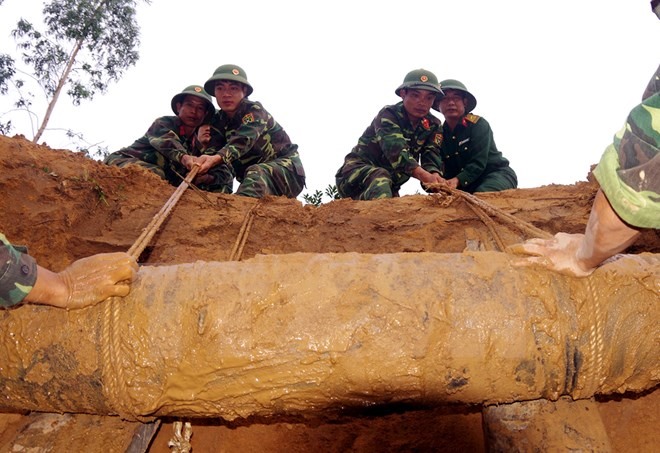 Society
Society

The Ministry of Labour, Invalids and Social Affairs (MoLISA) on Tuesday reported about unexploded ordnance (UXO) contamination from past wars in Việt Nam and activities undertaken to mitigate its effects.
 |
| Soldiers successfully removed a live 225kg bomb from the central province of Phú Yên last year. — VNA/VNS Photo |
HÀ NỘI — The Ministry of Labour, Invalids and Social Affairs (MoLISA) on Tuesday reported about unexploded ordnance (UXO) contamination from past wars in Việt Nam and activities undertaken to mitigate its effects.
The conference was held to observe International Mine Awareness Day, which is on April 4.
The ministry said that Việt Nam has faced severe consequences of UXO, which has greatly affected the country’s development in general, and people living in bomb- and mine-polluted areas in particular.
It is estimated that around 800,000 tonnes of UXO were left across the country after the war ended, mostly in the central region. More than six million hectares of land in the country is bomb-and mine-polluted, accounting for 18.82 per cent of Việt Nam’s total area.
At least 100,000 people have been injured and killed since the war, and environment and natural resources have been affected, the report said.
In central regions such as Nghệ An, Hà Tĩnh, Quảng Bình, Quảng Trị, Thừa Thiên-Huế, Quảng Ngãi and Bình Định, there have been 22,800 UXO victims, 10,540 of whom died.
As per statistics with the Sapper High Command, the US army used more than 15.3 million tonnes of explosives during the war in Việt Nam, and around 5 per cent of it remains unexploded.
To reduce and eventually get rid of unexploded bombs and mines, the Vietnamese Government has invested a lot for searching and handling UXO; on educating people to prevent accidents; and on promoting international co-operation between Việt Nam and other countries and partners in the region.
The Government has also assisted UXO victims and helped them integrate into the community.
Tô Đức, deputy director of MoLISA’s social assistance department, said UXO victims are defined as persons with disabilities caused by bomb and mine accidents. Support for the victims is combined with policies for people with disabilities, including the Law on Persons with Disabilities.
The ministry has also asked regions to provide treatment, training and jobs to UXO victims, and help them integrate into society. The MoLISA has also worked with the education and training ministry to promote special education for victims, Đức said.
Pointing out shortcomings in the provision of support, Đức said policies for the disabled should continue to be implemented effectively and support services and social work centres should be expanded.
He said hotlines should be set up for UXO victims who can ask for help when needed. There should be development in terms of hospital and function rehabilitation centres as well as vocational training and job creation.
A ceremony to mark the International Day for Mine Awareness and Assistance in Mine Action is scheduled to take place in the central Quảng Nam Province on April 4.
An exchange programme will also be held in Hà Nội later that day to support UXO victims. — VNS




